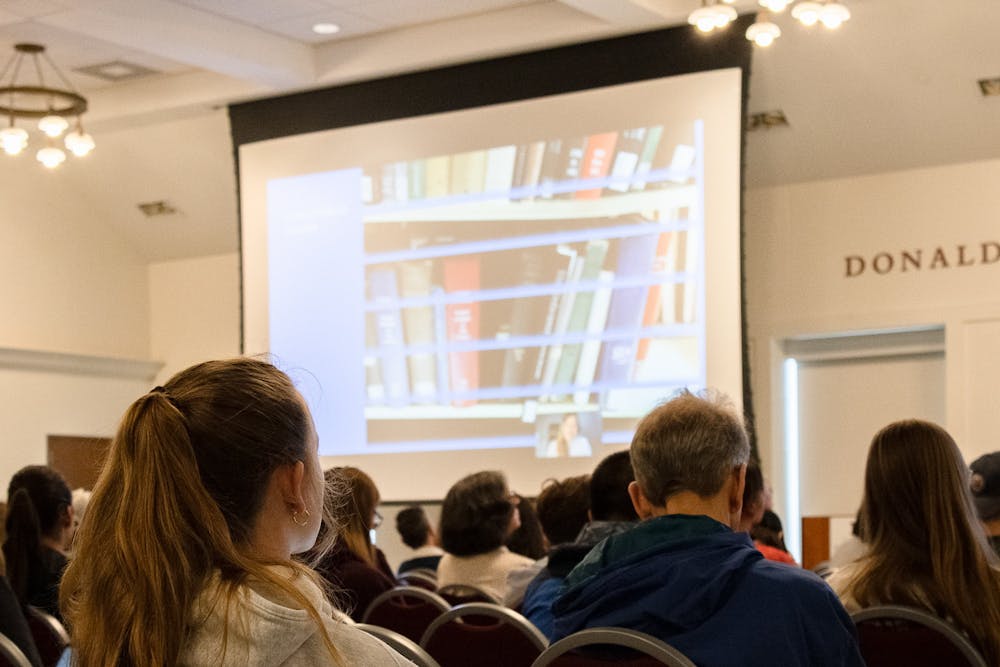The Donald W. Fritz Pavilion was crowded with students and faculty eagerly anticipating a lecture at 5 p.m. on April 4 from an acclaimed creative nonfiction professor from Brown University. This speaker was the eighth speaker of Miami’s 2023/2024 Altman Program in the Humanities, which this school year has followed a theme of environmental justice.
Once the clock hit 5 p.m., Elizabeth Rush greeted the crowd virtually from her home in Providence, Rhode Island. Along with teaching at Brown, Rush has written two books, one of which is “Rising: Dispatches from the New American Shore,” which was a finalist for the Pulitzer Prize in 2018.
Her most recent book, “The Quickening: Creation and Community at the Ends of the Earth,” chronicles her journey on an Antarctic expedition, delving into the lessons learned about our planet and our human connection to the South Pole.
“I was really intrigued and excited just to hear from someone who had such a raw experience in the Antarctic and just how that can fuel creativity,” said Samantha Stahlhut, an MFA creative writing graduate student.
Rush embarked on a journey aboard the Nathanial B. Palmer, an icebreaker ship. She was there after receiving a grant from the National Science Foundation’s Antarctic Artists and Writers program. She cited a lack of diversity in the stories told about our planet's southernmost continent as a primary reason for applying for the grant.
“The tales that get told and retold by each successive generation, they're kind of driven by the twin engines of extraction and imperial conquest,” Rush said. “The overwhelming majority of them are narrated by well-to-do white men from the Global North, so [that] was another starting place for this project.”
Her expedition was going to gather data on the rapidly melting Thwaites Glacier, which has been dubbed the "doomsday glacier" due to the catastrophic sea-level rise that would occur if it completely collapsed. She was there to document the stories of those on the ship, scientists and crew, who were making this journey to the glacier for the first time in human history.
Once on board, Rush quickly realized once she set off on the expedition that, despite being one of the few women to write a book on Antarctica, her voice alone would not suffice. She had spent much of her career talking to and writing about people who lived on the frontlines of climate disasters, particularly coastal flooding.
Over the months on board, she interviewed over 20 people and included them all in her book, which she described as “50% narrative and 50% screenplay,” on account of all of the perspectives.
“It became clear to me as I listened to my shipmates, that my task was really to make a kind of polyphonic, multi-vaillant, impossible-to-extract-a-single-narrative-from kind of story,” Rush said.
As Rush delved deep into the lives of her shipmates, she also began introspectively reckoning with her own life. At a point in her life where she was considering motherhood, Rush began to form connections between the human experience and glacial melting.
She explained that our own births could be likened to the creation of icebergs from glacial collapse, even though glaciers themselves are not alive.
Enjoy what you're reading?
Signup for our newsletter
It is hard to conceptualize the catastrophe that glacial melting can cause to sea level rise, but as Rush arrived at this glacier that no other humans had been to before with the people she had spent days interviewing, she realized that she needed to connect our human world with the non-human of ice to complete her narrative.
It was at this point that she knew she could offer a unique and encouraging perspective on Earth’s “last continent.” One that she hoped, despite the despair and unfathomable calamity that surrounds the potential of further glacial melting in Antarctica, would offer hope to readers.
One audience member was brought to tears as they asked her how she didn’t “fall apart” when learning about the catastrophic future that could arise from the collapse of the Thwaites glacier, to which she reaffirmed her belief in the power of narratives to instill a desire for change.
Some in the audience shared that her ability to present these narratives on climate change helps people how it impacts their lives.
“I think she's just trying to get us to connect our everyday lives to this invisible problem that is a part of our reality and needs to be part of our reality,” said Michelle Navakas, an English professor and 2023-2024 Altman Fellow. “...I think [she’s] kind of telling us, you need to bring the story of a melting glacier into your personal narrative and understand that it is the fabric of your world.”




